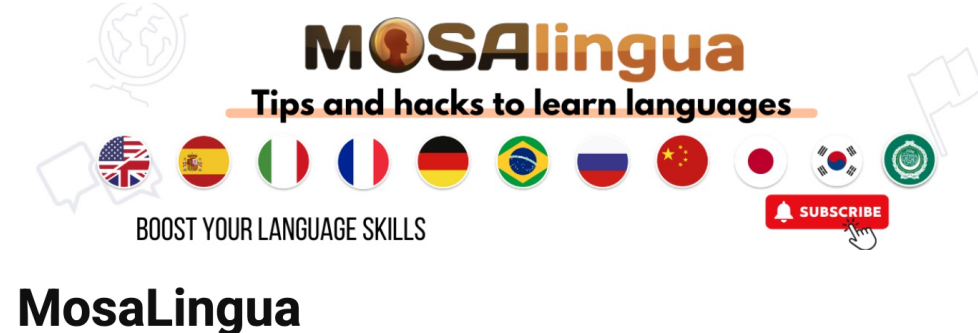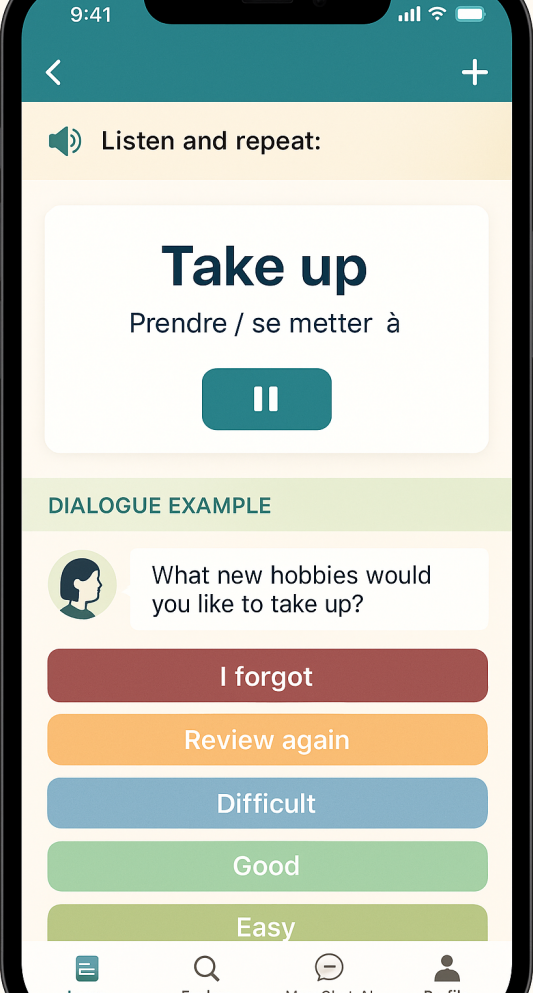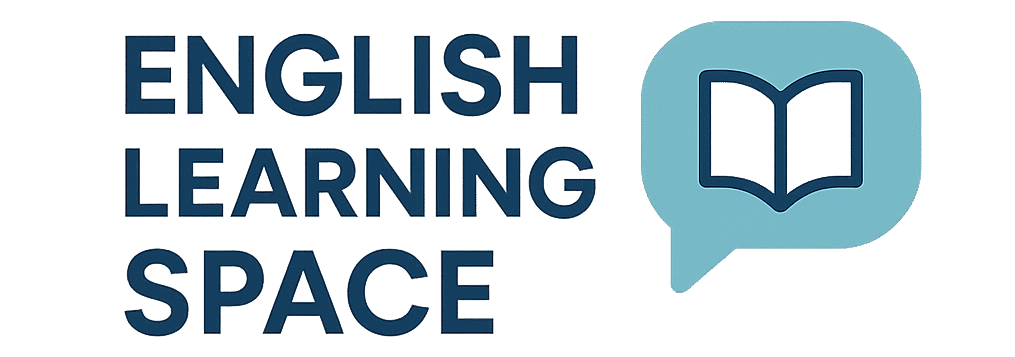 Building a strong English vocabulary can be challenging—especially for busy professionals juggling work, family, and other responsibilities. Many of my students have expressed frustration at forgetting new words quickly or struggling to use them in conversation. That’s what led me to research and review MosaLingua, an app that promises to make vocabulary building more effective and time-efficient, using science-backed techniques.
Building a strong English vocabulary can be challenging—especially for busy professionals juggling work, family, and other responsibilities. Many of my students have expressed frustration at forgetting new words quickly or struggling to use them in conversation. That’s what led me to research and review MosaLingua, an app that promises to make vocabulary building more effective and time-efficient, using science-backed techniques.
Based on my analysis as an English teacher and language learning specialist, here’s an honest, practical breakdown of how MosaLingua works—and who it’s best suited for.
How Mosalingua Supports Busy English Learners
MosaLingua is designed to help learners retain vocabulary more effectively without requiring long study sessions. These are the features that stand out for learners with limited time:
- Practical Vocabulary First
MosaLingua focuses on teaching useful words and phrases for work, travel, and everyday situations. The app avoids filler vocabulary, helping learners concentrate on what they’re most likely to use in real conversations. - Spaced Repetition for Long-Term Memory
It uses a spaced repetition system (SRS), which prompts learners to review vocabulary just before they’re likely to forget it. This technique has been proven to boost retention and reduce the need for constant re-learning. - Audio Dialogues & Real-Life Contexts
Lessons include realistic conversations and audio recordings by native speakers. These provide context and listening practice—ideal for those who want to hear how vocabulary is used naturally. - Flexible, Hands-Free Options
The app offers hands-free study sessions with audio playback, making it easy to review vocabulary during a commute or while doing other tasks—an excellent feature for multitasking professionals. - AI-Powered Chat Practice
MosaLingua recently added MosaChat AI, an interactive tool that allows learners to have practice conversations and receive instant feedback. It’s a useful addition for speaking fluency and phrase recall.
The app is also built with flexibility in mind. Study sessions can be as short as 5–10 minutes, and users can track their progress daily—encouraging consistency without overwhelming pressure.
The Science that Powers MosaLingua’s Approach
What sets MosaLingua apart is its foundation in learning science. These are the core techniques it uses:
- Spaced Repetition (SRS): Reminds learners to review vocabulary at optimal intervals to improve long-term memory.
- Active Recall: Instead of simply recognizing words, learners must recall them from memory, reinforcing stronger mental connections.
- Metacognition: After each card, learners rate how easy or difficult it was. This reflective process helps identify weak areas to focus on.
- Pareto Principle (80/20 Rule): MosaLingua teaches the most useful 20% of vocabulary that covers 80% of everyday situations.
- Microlearning: Emphasizes short, regular study sessions—ideal for busy learners who want results without cramming.
These techniques are grounded in research and support the kind of steady, meaningful progress many adult learners need
Pros and Cons from a Teacher’s Perspective
After reviewing the app in detail, here are the key strengths and areas to consider:
✅ What Works Well:
- Efficient, flashcard-based system that avoids overload.
- High-quality audio by native speakers.
- Organized by topic for focused learning (e.g., business, travel, health).
- Allows users to add custom vocabulary (useful for work-related terms).
- Offline access supports learning anywhere.
⚠️ Areas That Could Be Improved:
- The design is functional but not visually modern or gamified.
- Less appealing for complete beginners who may need more visual or translation support.
- Limited grammar instruction compared to full-service language platforms.
- Lacks the motivational features (e.g., streaks, badge
That said, MosaLingua excels where it matters most: helping motivated learners build real vocabulary and recall it when needed.
MosaLingua vs. Other English LearningApps
Compared to more gamified or entertainment-style language apps, MosaLingua focuses on efficiency and retention. It’s better suited for learners who want structured progress without unnecessary distractions. For English learners aiming to use the language at work, in emails, or in real conversations, this practical focus is a major advantage.

How Much Does It Cost?
MosaLingua Premium costs (2025) about $9.99 per month, and you get a full week as a free trial before being charged. There’s also a lifetime access option, which can save money if you plan to use it long term. Compared to other apps that can cost twice as much per month, I think it’s a budget friendly option, especially if you’re diligent about using it regularly. The app sometimes runs discounts for students or groups, which is worth checking out if you want to save more.
Who Should Consider Trying MosaLingua?
- Busy learners who want to make the most of their limited study time
- Self-driven people comfortable setting their own pace without lots of extra games
- Anyone who prefers listening and speaking practice in short sessions
- Learners aiming for practical English skills, not just passing grammar tests
If that sounds like your style, you’ll probably find real value in the app’s daily routine suggestions and review process. It’s also a solid pick for professionals preparing for job interviews or meetings in English, since you can focus on business vocabulary modules.

Common Questions About MosaLingua
Here are some answers to questions I’ve heard from students and tried to answer myself while testing the app:
Question: Can MosaLingua help me prepare for English proficiency exams?
Answer: Yes, it covers plenty of essential vocabulary for exams like TOEFL and IELTS. However, you’ll need to supplement it with grammar and writing practice since the focus is mostly on listening, reading, and speaking.
Question: Is it good for absolute beginners?
Answer: It works best for people with at least a little foundation in English. Complete beginners might want extra beginnerfriendly tools or a supportive teacher alongside the app.
Question: Can I use MosaLingua offline?
Answer: Yes, you can download content and review it without an internet connection, which I found really handy on subway rides or during travel.
Question: Is there a free version?
Answer: MosaLingua offers a short free trial, but after that, it’s a paid subscription. I think the value is fair compared to similar apps.
Question: How do I know if I’m making progress?
Answer: The app charts your learning with statistics, like how many words you’ve learned and how often you review. I appreciated seeing my streaks and improvements, even though the design was basic. For extra measure, try testing your skills in real life by chatting with a native speaker or writing short emails at work using newly learned phrases.
My Takeaway as an English Teacher
MosaLingua is a solid choice for busy adults looking to boost their English vocabulary and listening skills in a research backed, efficient way. If you want a straightforward tool that fits into a hectic schedule, I think it delivers on its promises. While it doesn’t offer the most colourful visuals or competition-based motivation, its focus on memory science and real-world usage makes it worth trying. If you sign up for the free trial, you’ll know quickly if the approach matches your learning style.
For more tips and recommendations on powerful English learning tools, I always recommend staying updated through newsletters or following trusted reviewer blogs. Growing your vocabulary and confidence in English is absolutely possible with the right tool and some steady effort each day. Don’t get discouraged if progress feels slow at first—even a few minutes a day adds up over time. Ultimately, MosaLingua stands out for those who appreciate structure and want real returns on their study time without the fluff.

